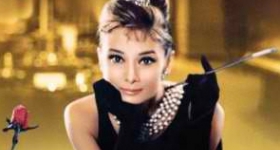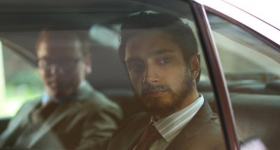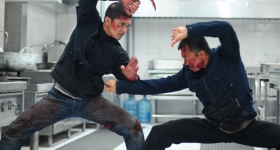WEED REFERENCES and extolling the virtues of female frontal nudity-exactly what you'd expect at a panel discussion about the movie Harold & Kumar Escape from Guantanamo Bay. Throw in an exhibit hall full of fanboys dressed as Japanese elf warriors and you can imagine the scene at San Francisco's WonderCon comic book and movie convention.
Writer-directors Jon Hurwitz and Hayden Schlossberg and co-leading man John Cho sat on a raucous promotional panel for the Harold & Kumar sequel.
After the discussion, most of the fans lined up to interact with Cho, 35, and profess their admiration for his work in American Pie, Off Centre, Better Luck Tomorrow, Kitchen Confidential, Harold & Kumar Go to White Castle, and their future allegiance to his Hikaru Sulu in the summer 2009 release of Star Trek.
Hyphen caught up with Cho before the panel debauchery to discuss the highly anticipated Harold & Kumar sequel and the Asian American acting experience. Here's what he had to say:
You're about to appear on a panel at WonderCon, which is notorious for Hs hardcore fans. Who are you a fan of these days?
JOHN CHO: I know this is really late, but I've become obsessed with The Sopranos on DVD. I've gone through five seasons in a matter of four months. I would say that's my obsession at the moment.
And what about your fans? Do you have American Pie and Harold & Kumar fans shouting catchphrases at you on the street?
JC: Sure. It's funny though. I was at a ComicCon for Harold & Kumar 1, and somebody walked out and pointed at me and said, "Charmed. First season. Episode 5."
You're here to promote Harold & Kumar Escape from Guantanamo Bay. In this film you guys are satirizing racial profiling, homeland security and even the Klan. What was your reaction when reading the script, especially since there was a significant shift from the first film?
JC: I thought it was a good shift. There's kind of a low-key energy to the first one, which was kind of charming. There was no way we could do it again. You only have one shot to do the tone of what we did. I feel like it's the same personality for the second movie. We just ramped up the stakes and made bigger explosions basically. I think we've topped ourselves even in the social and political jokes department and I'm happy with it. Very, very happy.
But the stoner bathroom humor is still there. Do you think that's key to talking about issues like this?
JC: Absolutely. I think you need something, in that if you're gonna talk about the issue in a feature film, you need a tight plot, you need something. And in our case, it's jokes. The issue must be secondary. It can't be primary. And if you can't make it secondary then you need to write an essay because you're in the wrong medium. Because what this medium demands is a story and characters and other constraints depending on the genre, and our genre is comedy, so we needed jokes. We needed jokes that were gonna be as big as the commentary.
One of the great things about the first film is that Harold gets the girl in the end. And both Harold and Kumar seem to get down with women of all colors, which is rare in film for Asian American characters. What can you tell us about the love lives of Harold and Kumar in the sequel?
JC: The sequel picks up exactly at the end of the first one. So we are trying to go to Amsterdam to get Maria. Maria's still on Harold's mind. And Kumar has a love interest in this one played by Danneel Harris, so it's his time to feel amorous.
Soon audiences will see you as Sulu in JJ. Abrams' Star Trek. Did you watch Star Trek as a kid and did the diversity of its cast have an impact on you?
JC: I didn't watch it religiously. I was sort of between generations. I was too young to have seen Star Trek originally, so I was more of a Sfar Wars kid. But over the years I would catch it on occasion and really enjoyed it and it meant a lot to me seeing George [Takei] on television. It was like, "look at this guy who isn't wearing a coneshaped hat" and it was stunning. He was just alone on television as an Asian American. So when this project came along, I was very keen on doing it because it was a legacy I really wanted to be a part of. It was a really important thing in my mind that he had been on the Enterprise. It's funny how important these fictions are, these narratives. It meant so much for me as a child. And it shouldn't. It's really just outsized, the amount of importance we place on it, but having said that, it's what it is. It meant a lot to me. I just couldn't be more happy to follow in his footsteps and hopefully I won't disgrace his name. [See the Redux section on page 12 for a story on the diversity of Star Trek.]
Is it hard to reinterpret a role that is so associated with George Takei?
JC: Yeah, some. I mean in a way you just have to not worry about it at all. First of all, I'm unable to speak like him. It's a physical impossibility [laughs]. In that way, I'm not sure I'd be able to do an imitation so that frees me right there. There's such a fan base out there. You don't want to piss anybody off or disappoint anybody. But I've seen a little bit [of the film] and I think people will be happy and I also think it'll make new fans as well.
One of your other films is West 32nd. The film takes place in New York City and deals with Korean gangsters. Did you learn anything about gangster Koreatown culture? Did anything surprise you?
JC: Did anything surprise me? The severity of the drinking, [laughs] It's almost athletic, the drinking in there. I was really excited to do West 32nd. I've been getting a lot of what I like to call Koreatown scripts over the years from Asian American writers who wanted to do a story in Koreatown, and I've never quite seen it work. This is the first time I've picked one up and said, "This is interesting" and really it was because the script wasn't about Koreatown. It just took place in Koreatown and was about other things. What I find very interesting about this character that I played was that he was an Asian American that was starting to fetishize being Asian American, which I think is an interesting thing, and I've seen it happen. I thought, "Oh, I haven't quite seen this [type of script]." There's a certain Asian American script that we tend to crank out because we've created this cottage industry for ourselves: what we like to see and what we think maybe the white man would like to see from us. It's difficult to break out of that cycle and it's difficult not to duplicate those habits. So Michael [Kang] and Edmund [Lee], who wrote the script, are very deft in creating something that was in a genre that I find interesting and other people find interesting and did it in a new way.
Looking at your resume, you have this balance between what people would call minority-driven projects and more mainstream projects. Do you feel a sort of responsibility to maneuver between these two?
JC: I have an interest in maneuvering between both and I do feel a certain responsibility in that ... responsibility's almost too heavy of a word. I don't know if I feel responsibility as much as I'm compelled to do it, and I think of the Asian American community whenever I make choices in my career and sometimes that's a burden. I always wonder whether they're going to accept this. You always want to ride the line where you don't want to do something perfect, meaning I don't want play a doctor that has four lines that is noble and perfect and no one has a problem with him. That's just not interesting. So you want to be as interesting as you can and play someone as effed up as possible. And you don't want to compromise yourself. You want to play someone effed up but there's a border where you cross because you're Asian. You're not sure how your community's gonna receive you. It's a case-by-case thing and it's something I think about with every role.
You've worked with a lot of Asian American independent fllmmakers and your wife [Kern Higuchi] is also an Asian American actress. What can you say about this community of actors and filmmakers in terms of obstacles, collaboration and support?
JC: Wow. I don't know. It's porous. I think the most important thing to keep in mind for our community, if you can count actors and filmmakers, is multiplicity of efforts. And I think sometimes we get caught up in the perfect role or the idea of the perfect role or the breakout movie or the Great Yellow Hope, which is an antiquated idea. We look for "the thing" and I think people were talking about Better Luck Tomorrow as the thing, the one. For all intents and purposes, it was the one for me, in my mind, whatever. Or it's not, it doesn't matter. I think change is gonna be generated from different viewpoints and different faces and it's not gonna be one star that breaks down a door, the proverbial door. It's gonna be 100 talented people knocking down 100 small doors.
Sylvie Kim is California-born and Ohio-raised. She works at Stanford University and contributes to the Hyphen blog.










Comments